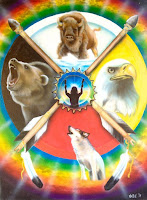Ilan Ziv (Icarus Films), Sheldon S., Pat Macpherson, Wisdom Quarterly
"The magical circle of investment and conquest... begins with the
discovery of the Americas. This is the engine of two wheels: the wheel
of scientific discoveries and the wheel of capitalist economy. Credit,
investment, profits. More credit, more investment, more profits."
—Historian Yuval Noah Harari
How did capitalism develop? For centuries, the standard tale -- laid out by Adam Smith in The Wealth of Nations
and repeated uncritically ever since -- has gone like this:
 |
| Adam Smith, economist, moral philosopher |
The trouble is that -- like the story of Columbus "discovering" America -- everything about this classical formulation is wrong.
 |
| You will be a conquered chattel-slave then freed to work for us as a wage slave: progress. |
.
 This episode "Capitalism" explores the origins of capitalism, arguing that it is
inextricably linked to the slave trade and colonialism, as well as the rise of Western science.
This episode "Capitalism" explores the origins of capitalism, arguing that it is
inextricably linked to the slave trade and colonialism, as well as the rise of Western science.
Capitalism came before Adam Smith by centuries: The plantations of the
West Indies were purely capitalist enterprises, as were the
privately-funded expeditions that colonized the US, India, Ireland, South America, Africa, and much of the world.
Like today's tech startups, these ventures offered high risk but huge rewards to those that succeeded.
On a journey covering four continents and nearly a millennium, viewers
discover the flourishing free market of 12th-century China.
 |
| Native economic systems |
Learn how
the economics of indigenous societies differed vastly from their
portrayal by Smith.
Understand how the European "discovery" of America fueled a scientific boom that was integral to colonization, race-based slavery, and economic exploitation.
Understand how the European "discovery" of America fueled a scientific boom that was integral to colonization, race-based slavery, and economic exploitation.
This created a global capitalist boom that was
felt from the bustling streets of China to the slave castles of West Africa, the
markets of Spain and to the pastures of England.


































































































































































































































No comments:
Post a Comment